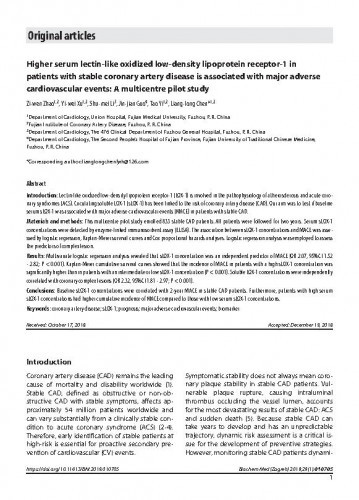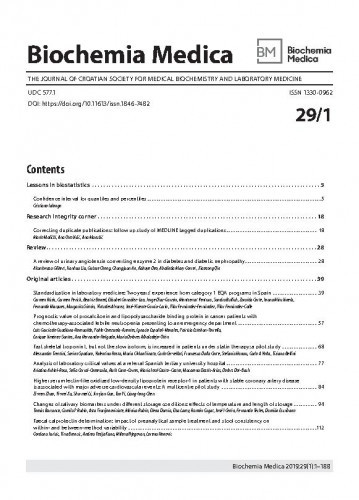Introduction: Lectin-like oxidized low-density lipoprotein receptor-1 (LOX-1) is involved in the pathophysiology of atherosclerosis and acute coronary syndromes (ACS). Circulating soluble LOX-1 (sLOX-1) has been linked to the risk of coronary artery disease (CAD). Our aim was to test if baseline serum sLOX-1 was associated with major adverse cardiovascular events (MACE) in patients with stable CAD.Materials and methods: This multicentre pilot study enrolled 833 stable CAD patients. All patients were followed for two years. Serum sLOX-1concentrations were detected by enzyme-linked immunosorbent assay (ELISA). The association between sLOX-1 concentrations and MACE was assessed by logistic regression, Kaplan-Meier survival curves and Cox proportional hazards analyses. Logistic regression analysis was employed to assessthe predictors of complex lesion.Results: Multivariate logistic regression analysis revealed that sLOX-1 concentration was an independent predictor of MACE (OR 2.07, 95%CI 1.52 - 2.82; P <0.001). Kaplan-Meier cumulative survival curves showed that the incidence of MACE in patients with a high sLOX-1 concentration was significantly higher than in patients with an intermediate or low sLOX-1 concentration (P <0.001). Soluble LOX-1 concentrations were independentlycorrelated with coronary complex lesions (OR 2.32, 95%CI 1.81 - 2.97; P <0.001).Conclusions: Baseline sLOX-1 concentrations were correlated with 2-year MACE in stable CAD patients. Furthermore, patients with high serumsLOX-1 concentrations had higher cumulative incidence of MACE compared to those with low serum sLOX-1 concentrations.
Sažetak

 Biochemia medica : the journal of Croatian Society for Medical Biochemistry and Laboratory Medicine : 29,1(2019) / glavna i odgovorna urednica Daria Pašalić.
Biochemia medica : the journal of Croatian Society for Medical Biochemistry and Laboratory Medicine : 29,1(2019) / glavna i odgovorna urednica Daria Pašalić.